
B2B (business-to-business) refers to companies that sell products or services to other businesses rather than individual consumers (B2C). While the target audience differs, all customers ultimately expect an enhanced customer experience.
In the B2B space, companies place a strong emphasis on improving customer relationships because their transactions are not only larger but also more complex than those in B2C.
Make prospects ready to buy
A sales pipeline CRM will help you visualize your process. In other words, it will show where your deals are!
A visual pipeline helps you reach goals. It breaks a process into trackable tasks and boosts your bottom line.
Your sales team can use one solution to see all your customers and connect it to your systems.
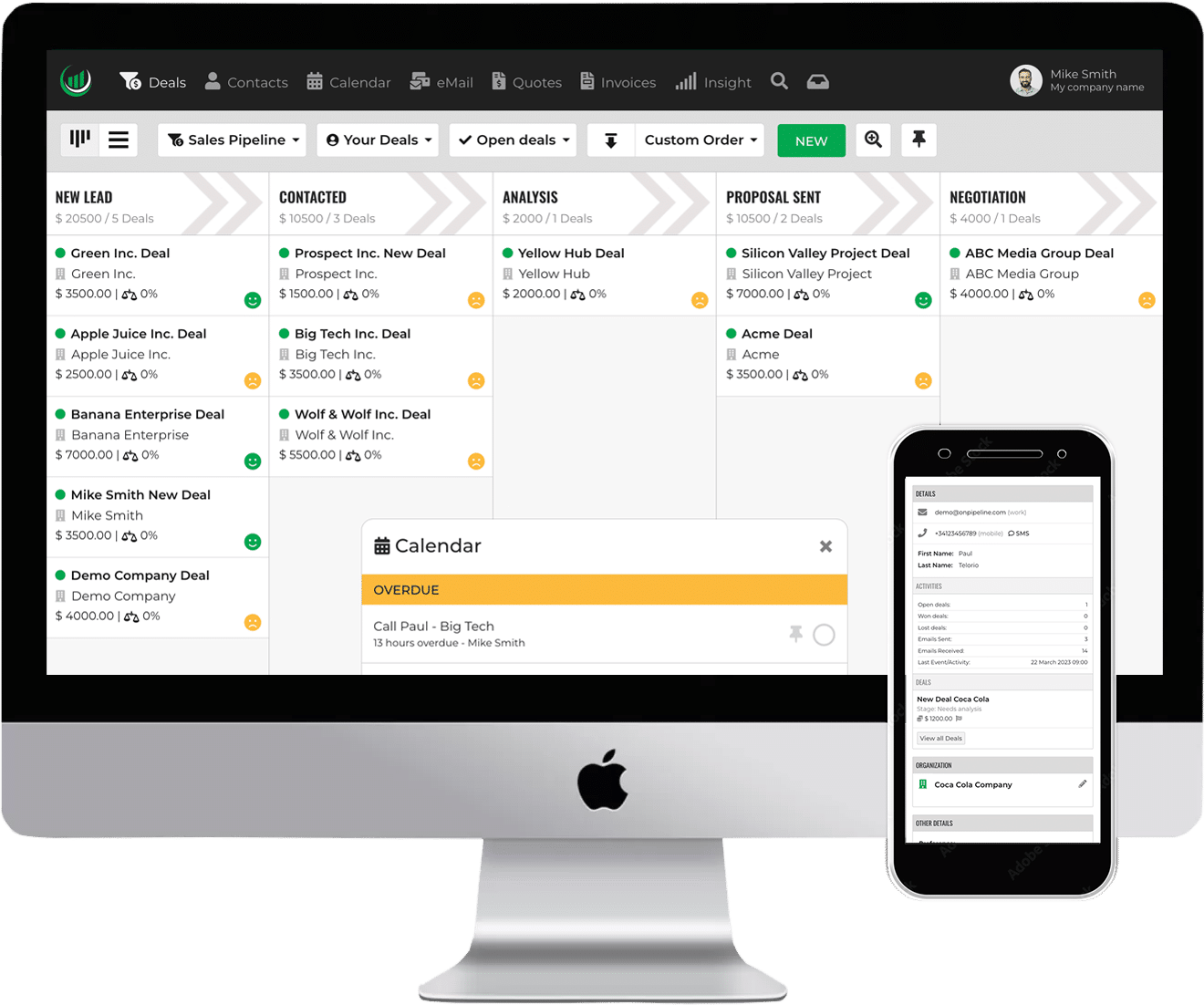
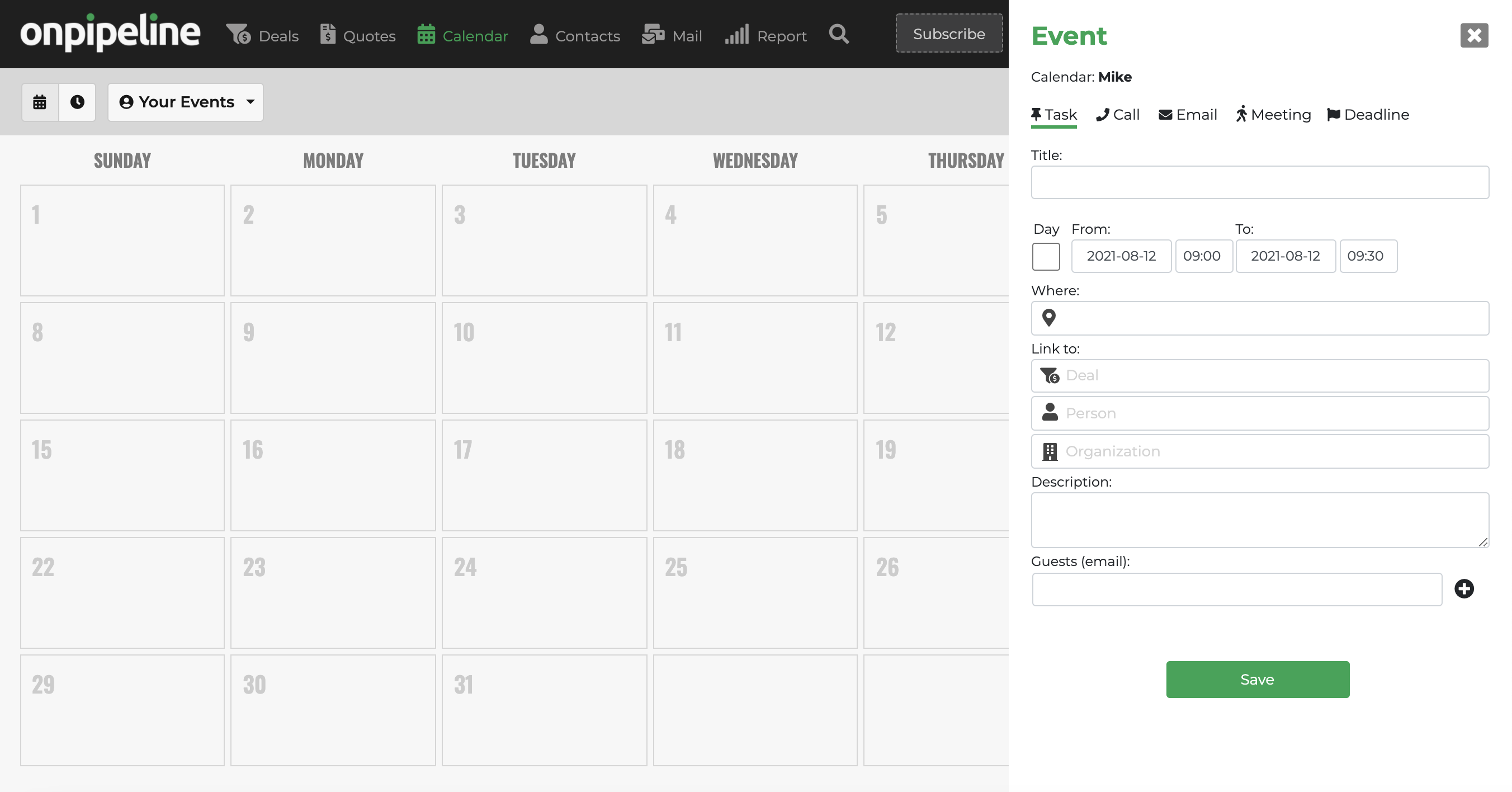
Activity Management
You can schedule tasks, calls, emails, meetings, and deadlines, linking them to deals and contacts, and customize activities to align with your business needs!
Automated reminders can be sent to your contacts via email or SMS, tailored to include specific details like time, date, and location.
Optionally, sync with your Gmail or Outlook calendars in a two-way replication.
Forecast your Sales
Perhaps the most important B2B CRM feature you should look for is the ability to help forecast for the upcoming month and year.
With Forecasts by Product you can view your sales (won deals) based on the products you sold and the products added to your “quotes”, based on expected closing date.
Also, forecasts are also a very important tool for provisioning.
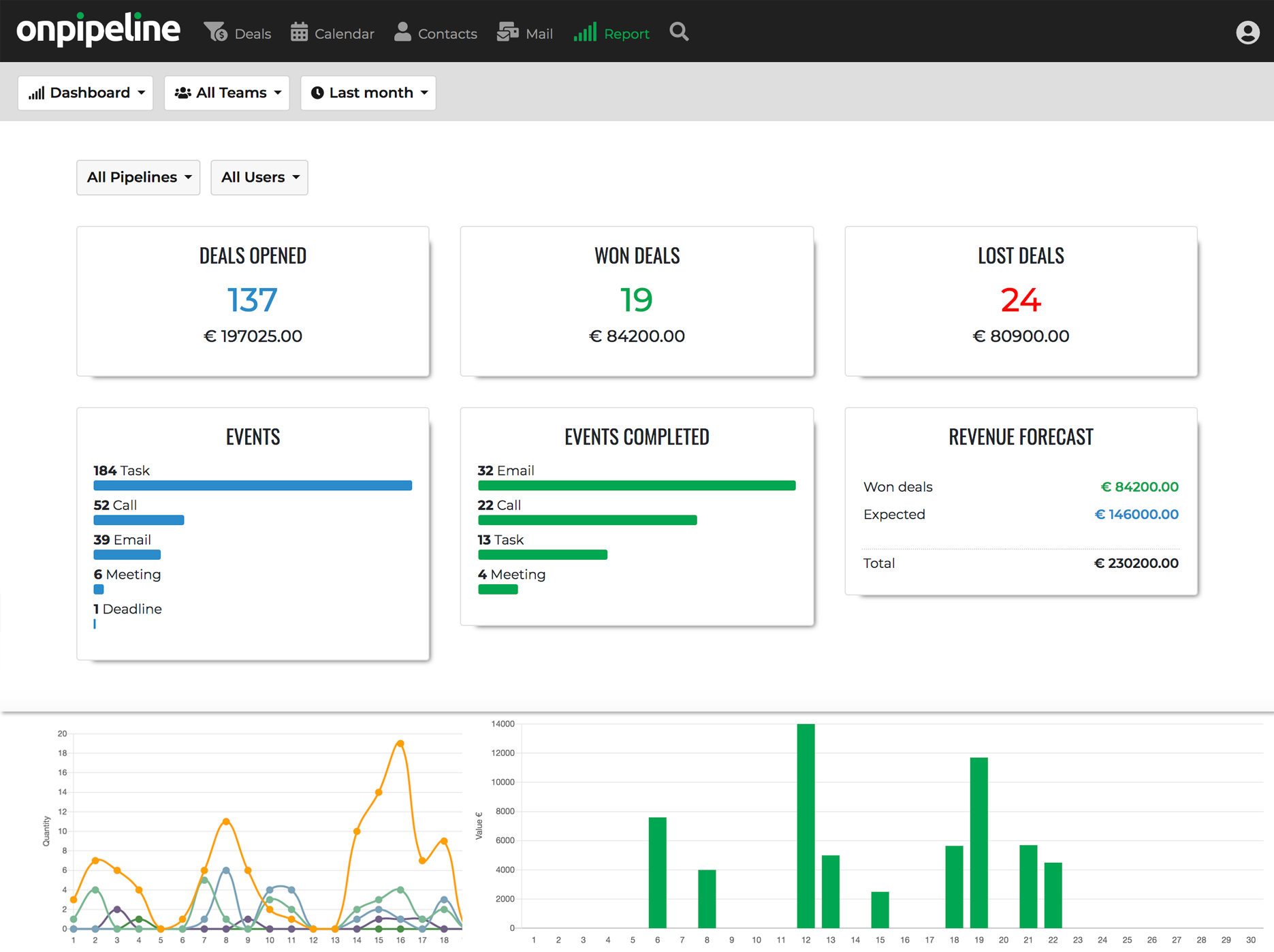
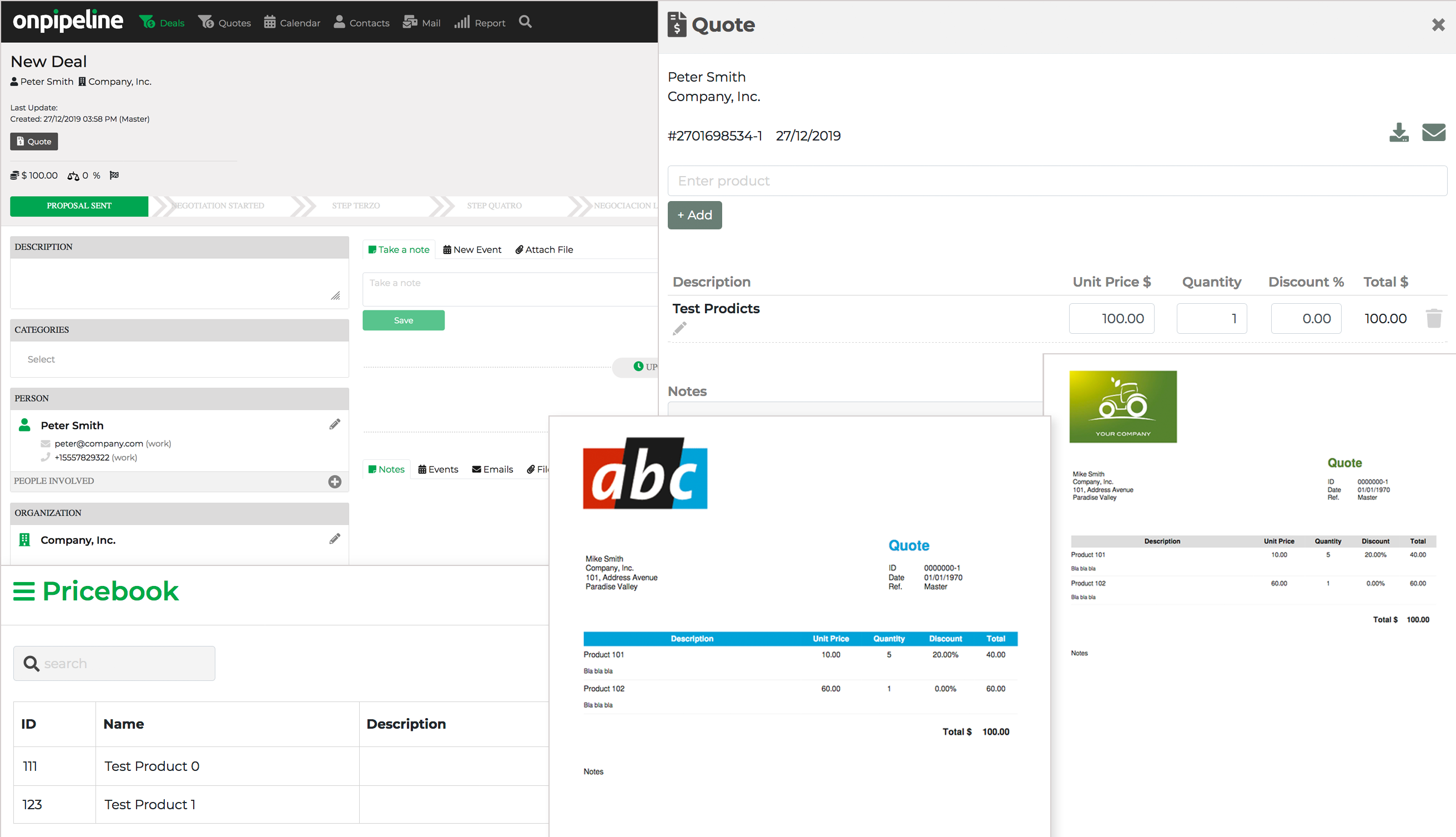
Quote Management
Professional price quotes can be easily created in your CRM from deals in 2 minutes, an you have the option to export as a PDF or send the offer from your email address.
Moreover, your quote template can be customized (and translated in any language) for each team, and you will use your own predefined pricebook.
New quotes can be subject to team leader/admin approval before the team members can send them to the customer.
Also, you can generate an unlimited number of quote revisions for each deal and access them from one central screen (quote history).
Invoices
Fully integrated invoicing software. Create multilingual and multicurrency Invoices (or Credit Notes) and send them directly to your clients in just a click.
You can send custom reminders or overdue notices, register payments and, most important, automatically turn Quotes or Subscriptions into Invoices.
Use the status overview to keep track of drafts, paid and unpaid invoices. You can also create different businesses with different templates.
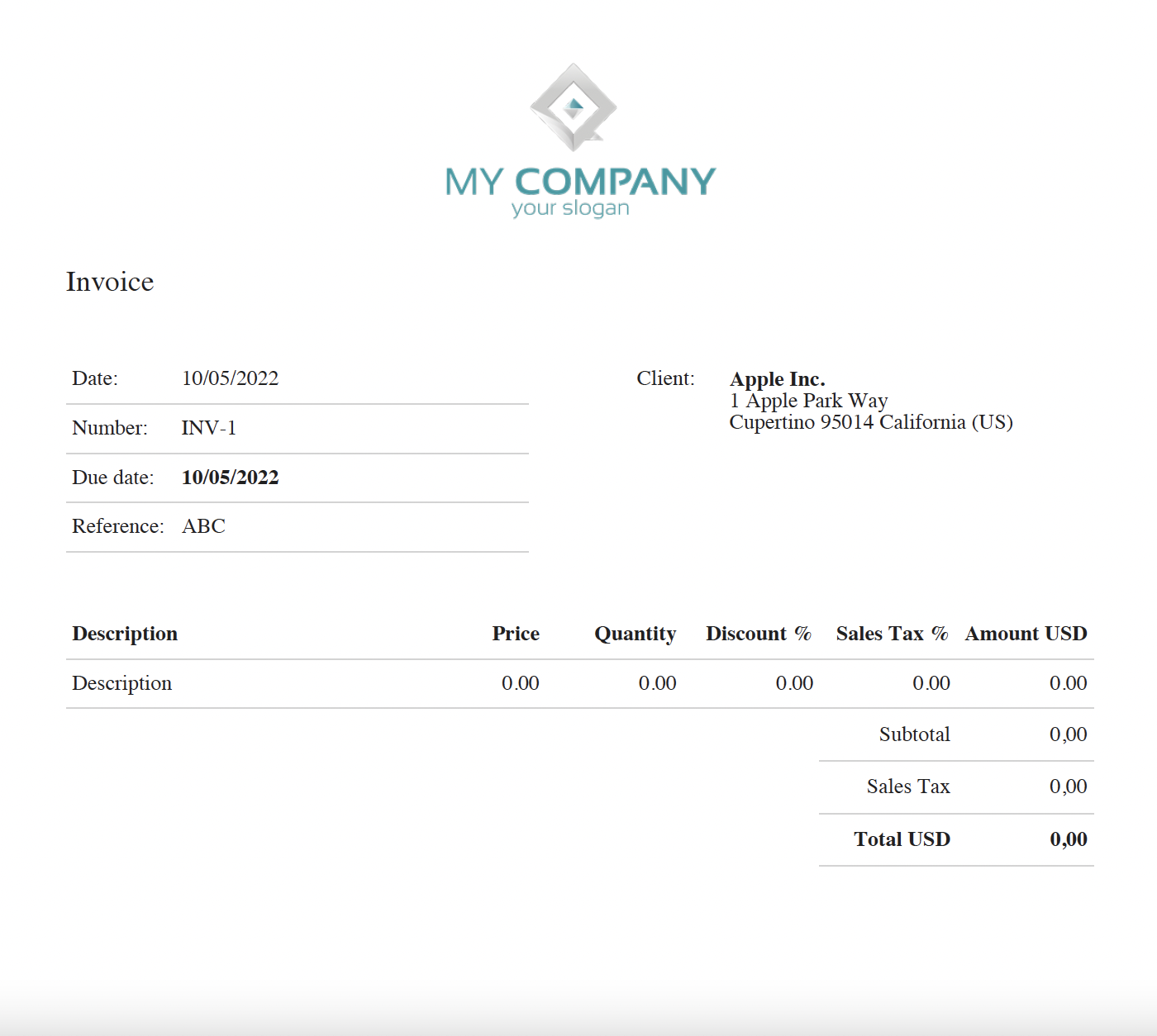
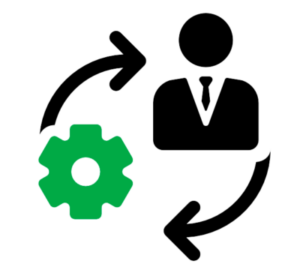
Save time with Automations
Automate and simplify processes across front and back-office. In a nutshell, you can save time on recurring tasks like manually sending emails or creating follow-up activities.
For example, the CRM allows you to send an email when a new contact is added, create an event when the deal is moved into a specific stage, automatically reassign a deal to another owner based on certain conditions, etc.
Understanding the Unique Needs of B2B Sales
In B2B sales, patience is indeed a virtue, and it’s imperative not to miss critical steps along the way. The cycle for B2B transactions tends to be longer due to the complexity of the products or services involved, as well as the need to align with the purchasing organization’s objectives and procedures. Sales teams must be prepared for a more extended period of nurturing and relationship-building before closing deals.
Sales Pipeline and Activity Management
A structured pipeline helps organizations visualize and manage every stage of the process. It provides clarity on where each prospective deal stands, helping sales teams prioritize their efforts. By tracking deals through various pipeline stages, you can ensure that no important steps are overlooked.
Customization and Personalization
B2B customers expect a high degree of customization and personalization. They often require tailored solutions that align with their specific business needs. Sales representatives must possess a deep understanding of the customer’s industry, challenges, and goals to provide the level of customization required to succeed in B2B.
Multi-Decision Maker Environments
In B2B sales, decisions are rarely made by a single individual. Instead, there are usually multiple stakeholders involved in the decision-making process. Onpipeline’s deal management system, can store information about all stakeholders on one page, ensuring that you have a comprehensive view of the decision-making landscape.
Relationship Building
Relationships are the lifeblood of B2B sales. Establishing and nurturing long-term relationships with clients is paramount. Unlike B2C, where one-off transactions are common, B2B often involve ongoing partnerships. Building trust and delivering consistent value are key to retaining B2B clients.
Frequently Asked Questions about B2B CRM
What is B2B CRM?
B2B CRM is a special type of CRM system made for businesses that sell to other businesses.
B2B CRMs are different from B2C CRMs. B2B CRMs handle complex sales processes and relationships with many stakeholders. They also manage longer sales cycles within client organizations.
The features help with managing leads and opportunities, visualizing the sales pipeline, and managing accounts and contacts. It also provides detailed reporting and analytics.
These systems help businesses sell more , build better customer relationships, and use data to make decisions.
How does B2B CRM benefit businesses?
B2B CRM systems have many advantages. These benefits include better customer relationships, smoother sales processes, and improved business efficiency. Here are some key advantages:
- B2B CRM systems help businesses by showing client history, preferences, and interactions. This enables more personalized and effective communication, fostering stronger and more lasting relationships.
- A B2B CRM organizes and manages the sales pipeline, making the sales process more efficient. Sales teams can focus on strategy and customer engagement by tracking leads, managing opportunities, and automating repetitive tasks.
- B2B sales involve many people within and outside the organization working together. CRM systems help people work together by providing a platform to share information and stay updated.
- CRMs have analytics tools that show insights on customers, sales trends, and the market. These insights can guide strategic decisions, from product development to marketing strategies.
- B2B CRM tools boost marketing efficiency by using precise customer data for focused campaigns. This results in better marketing, more customers, and higher returns on marketing investments.
- Businesses can provide better customer service by promptly accessing customer information and history. This helps them respond to inquiries and resolve issues more efficiently. This improves the overall customer service experience.
- B2B CRM systems help develop long-term sales strategies by analyzing sales data over time. This helps businesses in identifying successful practices and areas for improvement.
- A B2B CRM can grow as the business grows, handling more data and complex sales without losing speed or efficiency.
In summary, a B2B CRM system is important for businesses. It helps improve customer relationships, streamline sales processes, and make data-driven decisions. This leads to growth and success in the competitive B2B marketplace.
Can B2B CRM integrate with other systems?
B2B CRM systems are made to work with other business systems. Onpipeline has features that help with these integrations. Onpipeline offers APIs and Widgets that connect the CRM with other business tools and systems. Here’s how Onpipeline supports these integrations:
- Onpipeline’s APIs allow the CRM to connect with many other apps and databases. Data can sync instantly, so all platforms have the same and current information.
- Onpipeline offers widgets that add specific functionalities to the CRM. These widgets enhance its capabilities and make it work well with other systems used by the business.
- Onpipeline allows businesses to manage all their data in one place, including customer information and sales data. This centralized platform streamlines business operations.
B2B CRM systems need integration capability to help different departments work together smoothly. Integration ensures access to up-to-date information, streamlining processes and improving business performance.
What key features should a B2B CRM have?
To manage customer relationships and streamline sales processes, it is crucial to select a B2B CRM with key features. Here are the essential features to look for:
- The CRM should be able to track and manage leads and sales opportunities effectively. You can use tools to score leads, track progress in sales, and manage follow-ups.
- A good B2B CRM should help manage contacts and accounts well. It should store all client information, such as communication history, key contacts, and account details.
- Visualizing the sales pipeline helps sales teams understand the different stages of deals. This allows them to prioritize and strategize more effectively.
- The CRM should be able to change to fit your business’s sales processes, workflows, and reports.
- When choosing a CRM, make sure it can work well with other business systems like ERP, email and marketing tools.
- To track performance and understand customer trends, you need advanced analytics and reporting features. These features help you make data-driven decisions.
- Collaboration tools are important for a cohesive sales strategy. They have features like shared calendars and task assignments. They also allow for document sharing among team members.
- To access information and do tasks while on the move, it’s important to have a mobile-friendly CRM or a dedicated mobile app.
- Managing email campaigns and tracking their effectiveness is crucial for B2B marketing.
- Make sure the CRM is secure and follows data protection rules.
- A simple and easy-to-use interface is important so that users can adopt and effectively use the CRM.
How does B2B CRM manage and nurture leads?
B2B CRM systems manage and nurture leads by providing a structured and efficient approach to lead handling. Key functionalities include:
- CRMs capture leads from different sources and organize them in an easy-to-manage format. This can involve automated data entry from web forms, emails, or other channels.
We qualify leads using specific criteria and then assign them to the right salespeople. This ensures that leads are followed up by the most suitable team member. - CRMs send automated and personalized messages to keep leads engaged and moving through sales.
- CRMs keep track of how leads interact and analyze lead behavior. This helps improve sales strategies and understand effective methods.
- Integrating with marketing tools helps combine lead nurturing and sales and marketing efforts.
Onpipeline’s CRM is designed to handle leads with care, automate deal creation, assign sales reps based on conditions, and capture leads through web forms and APIs. In a B2B context, these abilities make managing and growing leads easier and more efficient.
How much a B2B CRM will it cost?
The price of a B2B CRM can differ a lot based on various factors. These factors include the specific features you need, the number of users, how much customization you want, and the vendor you select.
- Prices can range from low-cost options for basic functionalities to several hundred dollars per user per month for more advanced, enterprise-level systems.
- Many CRM providers offer tiered pricing plans to accommodate businesses of different sizes and needs. It’s common to see a per-user-per-month pricing model. Some vendors may have additional charges for extra features, integrations, customization, or support services.
Onpipeline offers a competitive and flexible pricing structure for its B2B CRM services. The pricing offers plans for businesses of all sizes, including small businesses and larger enterprises. The costs are based on the number of users and the length of time, so they can be adjusted to fit the needs of a business.
Free for 30 days!
No contract and no credit card required. Fully operational account. You can try and confirm the same settings by placing an order, or simply let the trial period expire.
Start today